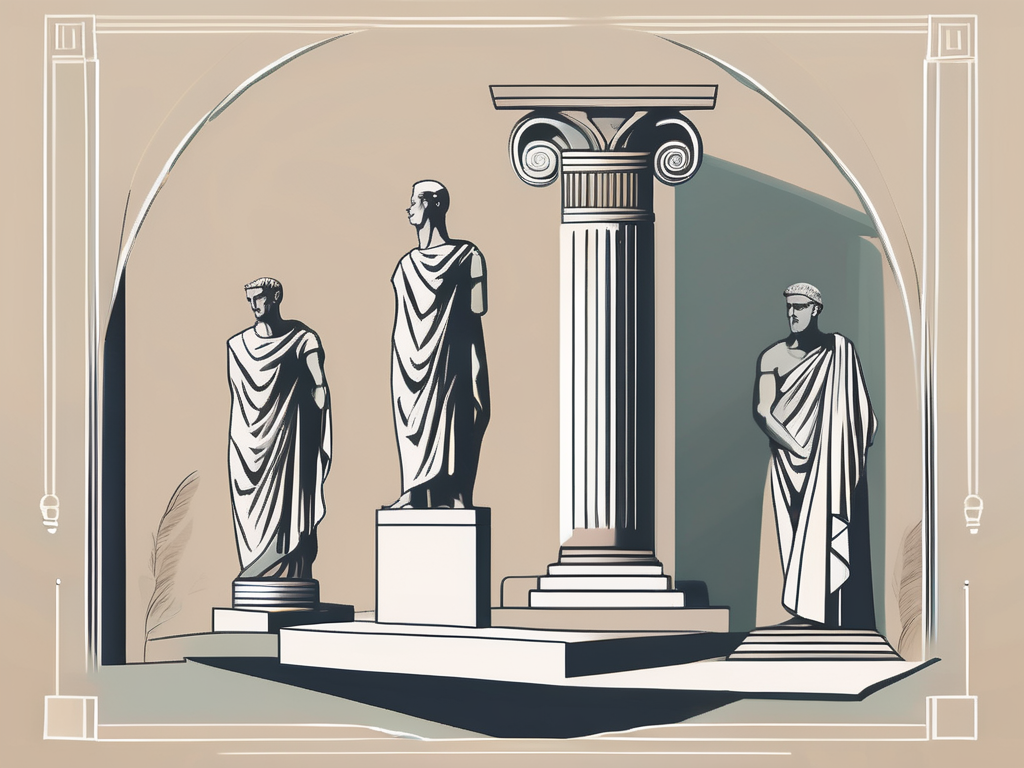Stoicism, an ancient philosophy grounded in the pursuit of tranquility and virtue, has long captivated the minds of scholars and thinkers alike. It was within this philosophical tradition that Publius Rutilius Rufus, a Roman statesman and philosopher, found solace and guidance amidst the chaos of ancient Rome. In this profound exploration, we delve into the life and teachings of Rufus, uncovering the enduring legacy of his Stoic principles.
Understanding Stoicism: A Brief Overview
To fully comprehend the impact of Rufus’ Stoicism, it is essential to first grasp the fundamental tenets of this philosophy. Stoicism advocates for the cultivation of inner resilience, emphasizing the control individuals have over their own emotions and perceptions. It encourages the pursuit of virtue, a steadfast commitment to moral integrity and wisdom. With a focus on the present moment and acceptance of one’s fate, Stoicism offers a practical guide to living a fulfilling and purposeful life.
Stoicism, originating in ancient Greece, was further developed and popularized in ancient Rome. Its teachings resonated deeply with many Romans, offering a source of personal strength and moral guidance amidst the chaos of the time. The philosophy found fertile ground in a tumultuous era characterized by political intrigue, military conquests, and social upheaval.
The Core Principles of Stoicism
Central to Stoicism are its core principles, which revolve around the concepts of virtue, indifference, and acceptance. Virtue, encompassing qualities such as wisdom, courage, and justice, is regarded as the highest good. Stoics believe that the pursuit of virtue is the key to a virtuous and fulfilled life.
Furthermore, Stoicism teaches the importance of indifference towards external circumstances and material possessions. Recognizing that these external factors are beyond our control, Stoics advise focusing on what lies within our power—our thoughts, actions, and attitudes. By embracing this indifference, individuals can find freedom and peace of mind.
In addition, Stoicism advocates for acceptance of one’s fate, embracing the idea that events are predetermined and beyond human control. Stoics urge individuals to adapt and respond rationally to life’s challenges, rather than succumbing to despair or frustration.
Stoicism’s emphasis on virtue and indifference towards external circumstances made it particularly appealing to the Roman elite. In a society marked by constant change and uncertainty, Stoic philosophy provided stability and wisdom. Renowned Stoic philosophers such as Seneca and Marcus Aurelius became influential figures, shaping the worldview of many Roman intellectuals, including Publius Rutilius Rufus.
Stoicism in Ancient Rome
The philosophy of Stoicism found fertile ground in ancient Rome, a tumultuous era characterized by political intrigue, military conquests, and social upheaval. Stoic philosophy resonated deeply with many Romans, offering a source of personal strength and moral guidance amidst the chaos.
Stoicism gained popularity among the Roman elite, who sought stability and wisdom in the face of constant change and uncertainty. Renowned Stoic philosophers such as Seneca and Marcus Aurelius became influential figures, shaping the worldview of many Roman intellectuals, including Publius Rutilius Rufus.
Seneca, a prominent Stoic philosopher and advisor to Emperor Nero, wrote extensively on the principles and practices of Stoicism. His writings, including letters and essays, provided practical guidance on how to live a virtuous life and navigate the challenges of the Roman society. Marcus Aurelius, another notable Stoic philosopher, served as the Roman Emperor from 161 to 180 AD. His personal reflections, recorded in his book “Meditations,” offer insights into the Stoic mindset and its application in daily life.
Stoicism’s influence extended beyond the intellectual elite to the wider Roman society. Its teachings were embraced by individuals from various walks of life, including politicians, soldiers, and merchants. Stoicism provided a framework for personal growth, resilience, and ethical conduct, enabling individuals to find meaning and purpose in a world filled with uncertainty.
Publius Rutilius Rufus: A Historical Background
To understand the profound impact of Rufus’ Stoicism, it is crucial to delve into the life and experiences that shaped him as a philosopher and statesman. Born into a prominent Roman family in the 2nd century BC, Rufus embarked on a remarkable journey that would intertwine his political career with his Stoic beliefs.
Rufus’ early life was marked by a thirst for knowledge and a deep curiosity about the world around him. As a child, he displayed an exceptional intellect and a natural talent for learning. His parents recognized his potential and ensured that he received the best education available at the time.
Studying law and rhetoric in Rome, Rufus honed his skills as an orator, captivating audiences with his eloquence and persuasive arguments. His prowess as a speaker earned him recognition and acclaim, propelling him onto the political stage. Rufus quickly rose through the ranks, gaining the respect and admiration of his peers.
Throughout his career, Rufus held various positions of power, including consul and governor. As a consul, he played a crucial role in shaping Roman policies and making decisions that would impact the lives of countless citizens. His dedication to public service and his unwavering commitment to justice earned him a reputation as a fair and honorable leader.
Despite his success in the political sphere, Rufus remained deeply committed to his Stoic beliefs. Stoicism provided him with a moral compass and a framework for decision-making, guiding his actions with unwavering integrity. He saw Stoicism not just as a personal philosophy but as a way of life that could bring about positive change in society.
Rufus as a Stoic Philosopher
Rufus not only embodied the principles of Stoicism in his political life but also actively engaged in philosophical discourse. He immersed himself in philosophical circles, exchanging ideas with fellow Stoic thinkers and influencing those around him with his wisdom and eloquence.
His philosophical pursuits went beyond mere discussions and debates. Rufus sought to apply Stoic principles to everyday life, believing that philosophy should not be confined to the realm of theory but should be lived and practiced. He encouraged others to embrace Stoicism as a means of finding inner peace and living a virtuous life.
Rufus’ philosophical writings, unfortunately lost to history, were believed to have delved deeply into the ideas of virtue, indifference, and acceptance. He explored the concept of virtue as the highest good, emphasizing the importance of cultivating moral excellence in oneself. Rufus also delved into the notion of indifference, teaching that true happiness lies in accepting and embracing whatever life throws at us, whether it be joy or sorrow.
Through his writings and teachings, Rufus left an indelible mark on the Stoic tradition, shaping the philosophy for generations to come. His influence extended far beyond his own lifetime, as his ideas continued to inspire and guide philosophers and individuals seeking wisdom and tranquility.
The Intersection of Stoicism and Rufus’ Life
The true impact of Rufus’ Stoicism can be seen through the lens of his political decisions and personal struggles. Stoicism became not just a philosophical doctrine for Rufus but a guiding force that influenced every aspect of his life.
Stoicism in Rufus’ Political Decisions
Rufus’ Stoic principles played a significant role in shaping his political decisions. Stoicism guided him in his pursuit of justice, demonstrating a steadfast commitment to the well-being of the Roman Republic and its citizens. His decisions were driven by a deep sense of moral duty and the pursuit of the common good.
In an era characterized by corruption and political intrigue, Rufus’ unwavering integrity and adherence to Stoic principles set him apart as a beacon of ethical leadership. His actions were a testament to the transformative power of Stoicism in the realm of politics.
Rufus’ Stoic Response to Exile
Despite wielding influence and respect, Rufus suffered the cruel fate of exile. Accused of conspiracy, he was stripped of his possessions and forced to leave Rome. It was during this period of hardship that Rufus exemplified the resilience and strength of his Stoic beliefs.
Embracing the Stoic principle of acceptance, Rufus faced exile with undaunted courage. He viewed this setback as an opportunity for personal growth and introspection, using his time away from Rome to deepen his understanding of Stoic philosophy.
The Lasting Impact of Rufus’ Stoicism
Rufus’ Stoicism transcended his own lifetime, leaving an indelible mark on the Stoic tradition for centuries to come. Through his writings and teachings, Rufus shaped the development of Stoicism, inspiring subsequent generations of thinkers to explore and expand upon his ideas.
Rufus’ Influence on Later Stoic Thinkers
Rufus’ Stoic principles resonated with later generations of Stoic thinkers, influencing the likes of Epictetus and Seneca. These philosophers built upon Rufus’ teachings, further refining and developing Stoic philosophy.
Epictetus, in particular, drew heavily upon Rufus’ ideas, incorporating them into his own influential work, “Discourses.” Rufus’ influence can be seen in Epictetus’ emphasis on self-discipline, personal responsibility, and the cultivation of inner resilience.
Rufus’ Stoicism in Modern Context
Despite the passage of centuries, Rufus’ Stoicism remains remarkably relevant in the modern world. In an era marked by uncertainty and upheaval, his teachings offer guidance and wisdom for navigating turbulent times.
Rufus’ emphasis on maintaining mental fortitude amidst adversity and his call for personal responsibility continue to resonate with individuals seeking to lead meaningful and fulfilled lives. His Stoic principles serve as a poignant reminder of the enduring relevance and applicability of ancient philosophy in our contemporary world.
The Relevance of Rufus’ Stoicism Today
Rufus’ Stoic principles are not meant to be confined to the pages of history but are rather intended to be integrated into our daily lives. By embracing his teachings, we can find solace and guidance in the face of life’s challenges, fortifying our inner resilience and cultivating our own virtue.
Applying Rufus’ Stoic Principles in Contemporary Life
Incorporating Rufus’ Stoic principles into our lives requires self-reflection and a commitment to personal growth. By focusing on what lies within our control, such as our thoughts, actions, and attitudes, we can cultivate resilience and find tranquility amidst the chaos.
Rufus’ emphasis on embracing adversity and accepting our fate serves as a powerful reminder to approach challenges with grace and fortitude. Rather than succumbing to despair, we can strive to adapt and grow stronger in the face of adversity.
The Enduring Appeal of Stoicism
The enduring appeal of Stoicism lies in its ability to offer solace and guidance to individuals seeking meaning and purpose in their lives. Rufus’ Stoic principles provide a roadmap for leading a virtuous and fulfilled life, allowing us to navigate the complexities of our modern world with equanimity.
By embracing the Stoicism of Publius Rutilius Rufus, we can embark on a profound exploration of our own inner selves, finding wisdom and resilience that can withstand the tests of time.












